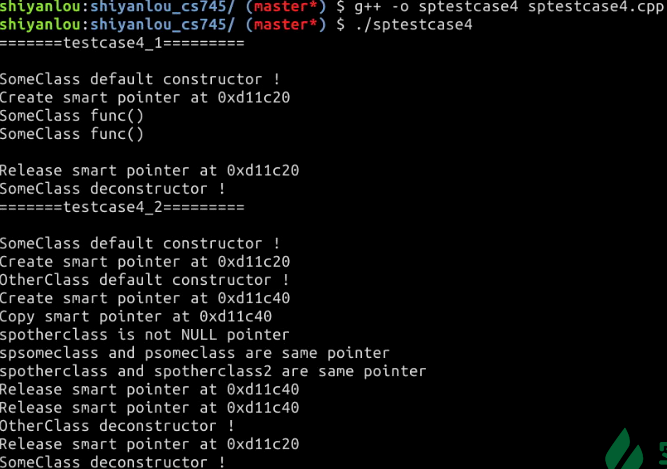- 解引用
重载*运算符时其返回的应该是智能指针所指的资源对象实体, 而->运算符则应该返回的是智能指针指针所指的资源对象的内存地址
// 重载*和-> 运算符
/*重载运算符* */
T&
operator* () const {return *mPointer;};
/*重载运算符-> */
T* operator-> () const {return mPointer;};- 判空与比较
// 方式1 智能指针与原生指针的比较
if (sp1==NULL)
if (sp1!=NULL)
if (sp1==p)
//方式2 智能指针与智能指针间的比较
if (sp1==sp2)可以用宏来简化代码的编写:
#define COMPARE(_op_)
bool operator _op_ (const SmartPointer& o) const {
return mPointer _op_ o.mPointer;
}
bool operator _op_ (const T* o) const {
return mPointer _op_ o;
}
// 重载==
COMPARE(==)
// 重载!=
COMPARE(!=)- 实现智能指针v4 smartpointer.h
/*
* file name : smartpointer.h
* desp : 智能指针版本v4
*/
#ifndef __SMARTPOINTER_H__
#define __SMARTPOINTER_H__
#define COMPARE(_op_)
bool operator _op_ (const SmartPointer& o) const {
return mPointer _op_ o.mPointer;
}
bool operator _op_ (const T* o) const {
return mPointer _op_ o;
}
template <typename T>
// 将智能指针类定义成模板类
class SmartPointer {
public:
// 默认构造函数
SmartPointer():mPointer(NULL) {std::cout <<"Create null smart pointer."<< std::endl;}
// 接收不同对象类型的构造函数
SmartPointer(T *p):mPointer(p) {
std::cout <<"Create smart pointer at "<<static_cast<const void*>(p)<<std::endl;
/*智能指针指向类T,引用计数加1*/
if (mPointer) mPointer->incRefCount();
}
// 析构函数
~SmartPointer(){
std::cout << "Release smart pointer at "<<static_cast<const void*>(mPointer)<<std::endl;
// 实现内存资源自动销毁机制
if (mPointer && mPointer->decRefCount()==0) delete mPointer;
}
// 拷贝构造函数
SmartPointer(const SmartPointer &other):mPointer(other.mPointer) {
std::cout <<"Copy smart pointer at "<<static_cast<const void*>(other.mPointer)<<std::endl;
// 引用计数加1
if(mPointer) mPointer->incRefCount();
}
// 赋值操作符
SmartPointer &operator = (const SmartPointer &other) {
T *temp(other.mPointer);
// 新指向对象,引用计数值加1
if (temp) temp->incRefCount();
// 原指向对象,引用计数值减1,如果减1后引用计数为0 销毁原资源对象
if (mPointer && mPointer->decRefCount()==0) delete mPointer;
// 智能指针指向新资源对象
mPointer = temp;
return *this;
}
// 重载*和-> 运算符
/*重载运算符* */
T&
operator* () const {return *mPointer;}
/*重载运算符-> */
T* operator-> () const {return mPointer;}
// 判空与比较
COMPARE(==);
COMPARE(!=);
private:
T *mPointer; // 指向智能指针实际对应的内存资源,根据参数自动推导规则,定义内部资源指针类型
};
/*引用计数基类*/
class RefBase
{
public:
RefBase() : mCount(0){ }
void incRefCount(){
mCount++;
}
int decRefCount(){
return --mCount;
}
// 调试接口,返回对象当前引用计数
int getRefCount() const {
return mCount;
}
virtual ~RefBase(){};
private:
int mCount;
};
#endif // __SMARTPOINTER_H__
- 测试代码:aptestcase4.cpp
/*
* file name : sptestcase4.cpp
* desp : 智能指针测试代码 case4 测试智能指针的解引用、判空及比较功能
*/
#include <iostream>
#include "smartpointer.h"
/*继承于引用计数基类的SomeClass类*/
class SomeClass: public RefBase{
public:
SomeClass(){std::cout << "SomeClass default constructor !"<<std::endl;}
~SomeClass(){std::cout << "SomeClass deconstructor !"<<std::endl;}
void func(){std::cout << "SomeClass func()" <<std::endl;}
};
/*继承于引用计数基类的OtherClass类*/
class OtherClass: public RefBase{
public:
OtherClass(){std::cout << "OtherClass default constructor !"<<std::endl;}
~OtherClass(){std::cout << "OtherClass deconstructor !"<<std::endl;}
void foo(){std::cout << "OtherClass foo()" <<std::endl;}
};
// 解引用测试
void testcase4_1(void)
{
std::cout << "=======testcase4_1=========" <<std::endl;
SmartPointer<SomeClass> spsomeclass = new SomeClass();
(*spsomeclass).func();
spsomeclass->func();
std::cout << "==========================" <<std::endl;
}
// 判空与比较测试
void testcase4_2(void)
{
std::cout << "=======testcase4_2=========" <<std::endl;
SomeClass *psomeclass = new SomeClass();
SmartPointer<SomeClass> spsomeclass = psomeclass;
SmartPointer<OtherClass> spotherclass = new OtherClass();
SmartPointer<OtherClass> spotherclass2 = spotherclass;
if (spsomeclass == NULL) std::cout<< "spsomeclass is NULL pointer" << std::endl;
if (spotherclass != NULL) std::cout<< "spotherclass is not NULL pointer" << std::endl;
if (spsomeclass == psomeclass)
std::cout<< "spsomeclass and psomeclass are same pointer" << std::endl;
if (spsomeclass != psomeclass)
std::cout<< "spsomeclass and psomeclass are not same pointer" << std::endl;
//
if (spsomeclass != spotherclass) // ERROR !
//
std::cout<< "spsomeclass and spotherclass are not same pointer" << std::endl;
//
if (spsomeclass == spotherclass) // ERROR !
//
std::cout<< "spsomeclass and spotherclass are same pointer" << std::endl;
if (spotherclass == spotherclass2) std::cout<< "spotherclass and spotherclass2 are same pointer" << std::endl;
if (spotherclass != spotherclass2) std::cout<< "spotherclass and spotherclass2 are not same pointer" << std::endl;
std::cout << "==========================" <<std::endl;
}
int main(void)
{
testcase4_1();
testcase4_2();
return 0;
}- 结果分析

最后
以上就是开心猎豹最近收集整理的关于C++实现智能指针(四)的全部内容,更多相关C++实现智能指针(四)内容请搜索靠谱客的其他文章。
本图文内容来源于网友提供,作为学习参考使用,或来自网络收集整理,版权属于原作者所有。








发表评论 取消回复